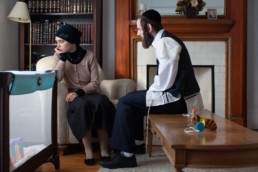Review: ‘Félix and Meira’
A forbidden romance deep rooted in Hasidic culture makes for a powerful and affecting watch.
Félix and Meira begins with a traditional Hasidic Jewish dinner: singing, celebration and religious clothing. Everyone seems comfortable except for Meira, our protagonist, and immediately through visuals we sense that something does not sit well with her. Thus begins the major conflict of the film as Meira debates internally her commitment to tradition.
Because of the timeless nature of this culture, at the beginning it is deliberately unclear what time period the film takes place in. Meira is scolded by her extremely traditional husband for playing LP records, indicating the film is a period piece. Yet as the film goes on and Meira slowly ventures outside of her Hasidic bubble, we realize that the film does, in fact, take place in present day, yet we discover it through her eyes and slowly it becomes more modern. The visual palette (like a love child of last year’s Ida and A Most Violent Year) distinctly drives Meira’s journey, making the modern world look, in a distinct way, unlike anything I have ever seen in a movie.
Most romance audiences prefer the more saccharine Nicholas Sparks adaptations, but would truly enjoy seeing something much more subtle and powerful as seen in Félix and Meira.
While focusing on Meira and her doubts in her beliefs, the film quickly develops into a love story. Despite being married and living among the traditional culture, Meira falls for Félix, a bachelor without the same family values. This isn’t the adulterous kind of romance – everything is subdued, making even holding hands feel like a display of passion. The suspense remains because of how forbidden the relationship is in the first place, and thanks to top-tier performances and direction, the relationship between protagonists never feels inauthentic.
The dramatic sequences scattered throughout the film significantly outweigh the overall narrative. The symbols are rich without being overt. As said above, this is a movie full of subtlety that matches the emotional tone of the characters. The singular unsubtle moment happens right after Félix and Meira first spend time together, when the film transitions to an isolated clip seemingly unrelated yet emotionally moving. I would have been happy to see more of these, but alas because it only happened once, it draws more power to itself.
As stated above the primary conflict of the film is tradition vs. love, which is incredibly powerful yet not as universal in today’s world. Unfortunately, Meira’s husband is reduced to being a caricature and not given enough complexity as a character. Had he been more layered, it would increase the stakes in how difficult it would be for Meira to decide to stray away from him. Regardless, this is the romantic drama that people should yearn for. Most romance audiences prefer the more saccharine Nicholas Sparks adaptations but would truly enjoy seeing something much more subtle and powerful as seen in Félix and Meira.
Félix and Meira opens at the Laemmle Royal Theatre on Friday.
H. Nelson Tracey
Nelson is a film director and editor from Denver based in Los Angeles. In addition to writing for Cinemacy, he has worked on multiple high profile documentaries and curates the YouTube channel "Hint of Film." You can check out more of his work at his website, hnelsontracey.com


